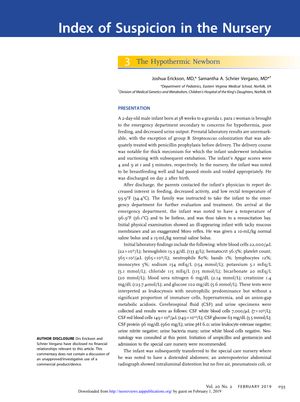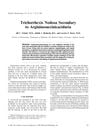Case 3: The Hypothermic Newborn
February 2019
in “
Neoreviews
”

TLDR The infant with a urea cycle disorder improved with treatment and a liver transplant.
A 2-day-old male infant with hypothermia, poor feeding, and decreased urine output was diagnosed with argininosuccinate lyase (ASA) deficiency, a urea cycle disorder. Initial treatment included saline boluses, antibiotics, and nitrogen scavenger therapy, which normalized his high ammonia levels. Genetic testing confirmed the diagnosis, and he was managed with low-protein nutrition and medications. The infant improved, was discharged with ongoing follow-up, and received a liver transplant at 8 months, which helped him thrive and meet developmental milestones. ASA deficiency, characterized by elevated citrulline, can cause severe metabolic disturbances if untreated.
